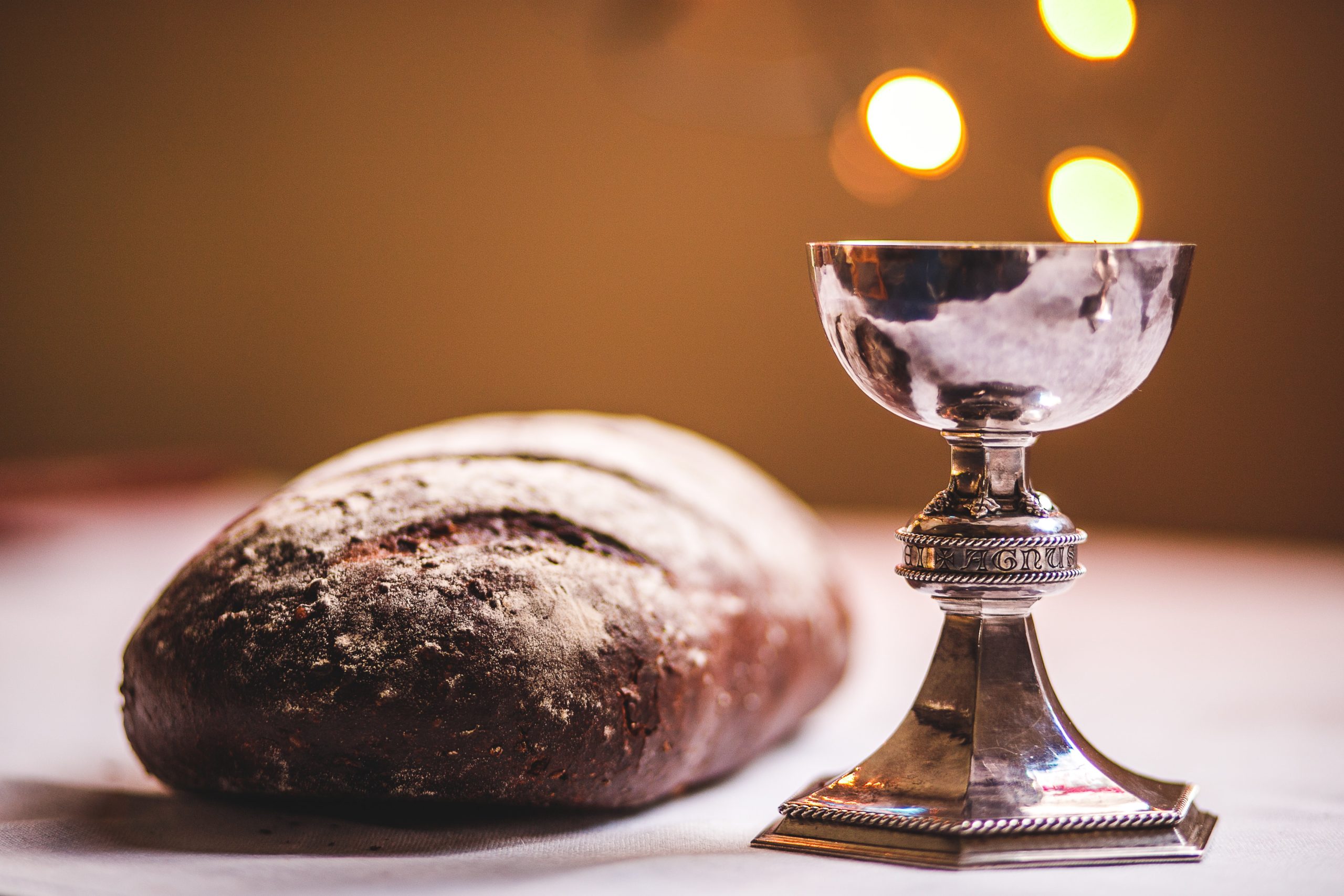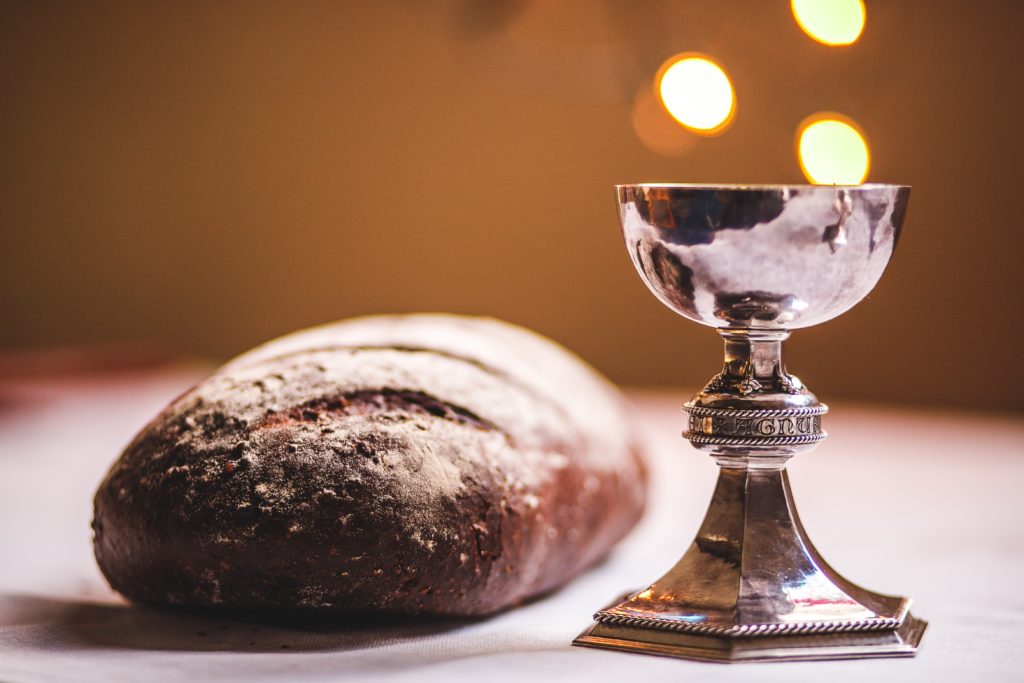So many things separate the different denominations within the Church. We disagree about many matters of theology. However, it is the things that most every Christian agrees on are that bind us together. These beliefs are much stronger than what divides us.
The ties that bind
The sacraments are one of these “sticky” items. To be fair, churches even debate the term sacrament. Some denominations don’t like the word sacrament. Other denominations are okay with the term, but don’t agree on what makes a sacrament.
Most commonly, sacraments are known as an outward or physical act that leads to inward grace. Universally, most denominations agree that both communion (the Lord’s Supper) and Baptism are sacraments. Other segments add things like marriage and confession to this list (up to a total of 7).
Communion + Covenant
For now, I want to focus on communion.
The average church goer thinks of communion in terms of bread and wine or juice and crackers (or maybe graham crackers and juice boxes if you’re in a pinch). If you really want to understand the depth behind the Lord’s Supper, you need go beyond the bread and wine. The importance of communion lies in the word “covenant.”
Contract vs Covenant
We live in a contractual culture. We understand signing a contract. You may have a contract for your job. You may have signed a contract when purchasing a home or car. A contract is legally binding. It ties me to that job, house or car…usually from a financial perspective. But there is one important key when we think about a contract…
We break contracts.
It may cost me financially. We may lose actual dollars. Our credit score may decline (a long-term financial cost). I may lose out on future work. We sign a contract to protect both parties in case the contract is broken…because we break contracts.
Covenant is ancient.
We confuse covenant with contract because we inherently understand contract. In fact, many times when we refer to covenant within the church, we interchange the word covenant with contract. And while covenant and contract are similar, the implications are vastly different.
Covenant is ancient. One of the first covenants made is between God and Noah (in essence all of humanity) after the worldwide flood. God promised or made a covenant to never again flood the entire earth (Genesis 8).
However, the next covenant God made maybe the most important ever (excluding what Jesus did, which we will get to in a moment). God and Abraham “cut” covenant after Abraham left his home and took his small family to an unknown location displaying his faith in God (Genesis 15). God appeared to Abraham and reaffirmed the promise to make Abraham into a great nation. Then God literally cuts in half several animals and walks between the pieces to establish this covenant between Him and Abraham (hence the term “cut” covenant). It’s a bloody picture for sure, but the meaning is immense for Abraham, his lineage, the Jewish people, and even you and me.
Covenants are forever.
God’s promise in this covenant with Abraham was forever. Humans cannot break a covenant with God. Abraham and his descendants could (and did) attempt to break the covenant, but God wouldn’t. Abraham and his descendants would belong to God. God would be their God.
God would be with them.
The Old Testament is the story of this covenant God made with Abraham. It’s the story of His people both keeping and breaking the covenant. It’s a story of God’s faithfulness to His covenant even in the midst of their unfaithfulness. This covenant remained until the time of Jesus.
A new covenant
And then Jesus ushered in a new covenant.
What makes the Lord’s Supper so important, both at that time, today and into the future is the symbolism of God’s new covenant. Blood is integral to creating covenant (circumcision was originally a reminder of God’s covenant with Abraham). Abraham sacrificed several animals at that first covenant. God sacrificed his own Son for this covenant. The act of communion recreates this covenant, hence the reason it is a sacrament (and outward act dispensing inward grace) to all who partake.
When you eat the bread and drink the wine, you physically reaffirm the covenant God made 2000 years ago. You admit your short coming. Partaking in the bread and wine declares you are a sinner. You remind yourself of your need for a savior. But just as importantly, you identify with Jesus as a child of God.
You cut covenant with God.
The amazing thing is God now sees you as his child…forever. This covenant between you and Him can not end. You may make mistakes. You may…no you will…sin again (and again…and again). The covenant will remain between you and God. Short of walking away…forever…there is nothing you can do to break God’s covenant. And even then, God will continue to chase you, longing to keep the covenant He has made with you.
But communion is more than covenant. It IS about the bread and the wine. There is a reason Jesus kept the meal simple. The bread means something. The wine is important. Jesus is speaking to use in these two simple elements.
Communion: the Bread
In the book of John, there is the famous story of Jesus feeding 5,000+ people with only 5 loaves of bread and a couple of fish. The next day, a large group of people gather around Jesus, demanding another miracle. In their demands, they refer all the way back to Moses feeding the Israelites in the wilderness. God miraculously sent manna or bread from heaven daily to the Israelites as they wandered the desert for 40 years.
The people ask Jesus to give them this type of bread again…daily. Jesus replies, “I am the bread of life. Whoever comes to me will never be hungry again. Whoever believes in me will never be thirsty.” (John 6:35)
When Jesus passes the bread around the table on the night he was betrayed for his last meal with his friends he refers back to this encounter. Jesus says, “This is my body, which is given for you.” (Luke 22:19)
Jesus is the sustenance we are looking for. He sustains us spiritually, emotionally, and even physically (his body was broken on his road to the cross and on the cross itself, so we can experience healing. The full healing is complete upon our death and resurrection with Jesus in eternity). We look for help and support all over the place, and many of those support systems are a great supplement, but Jesus is enough.
Jesus is the bread of life.
Communion: the wine.
Next, Jesus passes around a cup of wine and says, “This cup is the new covenant between God and his people — an agreement confirmed with my blood, which is poured out as a sacrifice for you.” (Luke 22:20)
Ah, do you see it now? Jesus made a covenant between us and God. Jesus used his own blood to confirm this covenant. The wine or juice we drink at communion is a reminder of what happened 2,000 years ago. I am in an unbreakable covenant with God. Despite my own unfaithfulness, God remains faithful.
Again, looking back to Moses, on the night of the first Passover, a lamb was sacrificed in every Jewish household as a sign of the forgiveness of their sins. A bit of the blood was then painted on the door frame of every house so the angel of death would pass-over that house.
Every time you partake in the Lord’s Supper, you reconfirm the covenant between yourself and God. But in addition to all of that, when you drink the juice, you are now made whole and clean through this sacrifice of Jesus. God forgave your sins. The ultimate destruction will pass-over your life.
Communion: Don’t forget.
When Jesus hands the bread to his friends, he adds these few words, “Do this in remembrance of me.” (Luke 22:19). Communion is an act of remembering. We remember the covenant God has made with us. Communion reminds us Jesus is enough. We remember our sins are forgiven. We are reminded we are now God’s children.
With this perspective, communion is so much more than just a cracker and juice while it is still all about the bread and the wine. It is indeed a sacrament. So don’t forget, God dispensed grace to you. Remember, God forgave you. Be reminded of who you belong to. You are a child of God.
Forever.




Leave a Reply